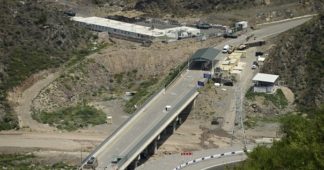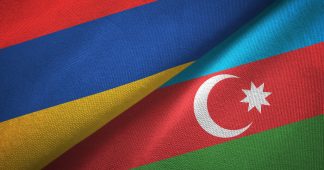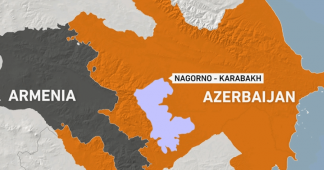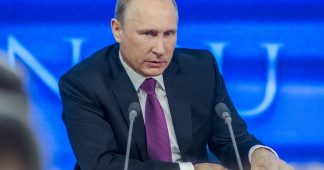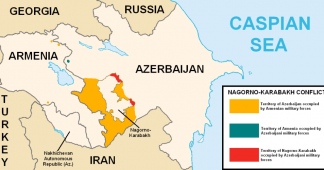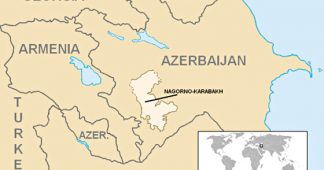A blockade has been imposed on the breakaway region of Nagorno-Karabakh, limiting the flow of vital supplies and threatening 120,000 lives
On a good day, Nina and her family have just enough food to avoid starvation. Bread and cucumber for breakfast. A handful of vegetables for lunch. Even maybe potatoes with salt for dinner. But on a bad day, this type of sustenance can be impossible to come by.
“If this continues, people will end up dying,” the 23-year-old says over the phone, before correcting herself: “People are already dying.”
Nina is one of 120,000 ethnic Armenians living a life of destitution and despair in Nagorno-Karabakh, a landlocked breakaway state in the South Caucasus which has long been disputed by Azerbaijan and Armenia.
Since December 2022, the main road connecting Karabakh to Armenia and the outside world – the Lachin Corridor – has been blocked by Azerbaijan, preventing the flow of 90 per cent of food, medicine, fuel and other supplies into the territory.
The blockade is proving fatal and fuelling an ever-worsening – and largely unnoticed – humanitarian crisis on Europe’s doorstep.
“Now everybody is very sick because of malnutrition and unless you are almost dying, you don’t go to hospital because the queues are very long,” says Nina from her home in Stepanakert, the de-facto capital of Karabakh, adding that supermarket shelves have been “empty for a long time now”.
She describes how her friend’s uncle recently died of a heart attack – the ambulance couldn’t find any fuel and was slow to reach him. He died on the way to hospital. “What is this if it is not genocide?” Nina asks.
Last month, Arayik Harutyunyan, the president of Nagorno-Karabakh, known as Artsakh in Armenia, declared the region a “disaster zone”. The population previously relied on stockpiles, he said, but now “we are running out of stocks in a matter of days, or hours”.
“Azerbaijan’s aim is of ethnic cleansing,” he added. “There is now a complete siege.”
The former prosecutor of the International Criminal Court recently warned that Azerbaijan is preparing genocide against Karabakh’s ethnic Armenians, who make up the vast majority of the region’s population, and called for the UN Security Council to bring the matter before the international tribunal.
“Starvation is the invisible genocide weapon. Without immediate dramatic change, this group of Armenians will be destroyed in a few weeks,” Luis Moreno Ocampo said in a report published on August 9.
Nagorno-Karabakh is no stranger to tragedy. The territory, which is internationally recognised as Azerbaijan, has been a source of conflict and violence since the disintegration of the Soviet Union.
The First Nagorno-Karabakh War raged from 1988 to 1994 as the ethnic Armenian majority backed by Yerevan broke away from Azerbaijan. Tens of thousands of civilians and troops died, and more than one million people were displaced before a fragile ceasefire was put in place.
Heavy fighting erupted again in September 2020 after Azerbaijani forces broke through Armenian defences and reclaimed large chunks of the territory.
The 44-day war culminated in the death of more than 6,000 soldiers and was ultimately resolved after Russia, an ally to both Armenia and Azerbaijan, stepped in to negotiate a ceasefire.
Under the deal, Russian peacekeepers were deployed to Karabakh to guard the only road left linking the enclave with Armenia – the so-called Lachin Corridor.
Fighting continued to break out after the ceasefire, and in December 2022, Azerbaijan began a blockade of the three-mile road into Karabakh, closing the territory to all but Russian peacekeepers and Red Cross convoys.
But even the Red Cross has since been blocked by Azerbaijan after it was accused of smuggling contraband into the territory. Their last delivery of aid was on July 7, according to Zara Amatuni, a spokesperson for the charity in Armenia.
However, she says, this was only “medicine and baby formula” and not food supplies or hygiene items, which haven’t been delivered for a long time.
A 19-truck convoy carrying around 360 tonnes of much-needed humanitarian cargo from Armenia has been stuck at the entrance of the Lachin Corridor for the past two weeks, waiting for permission to pass through Azerbaijan’s checkpoint.
The clock is now ticking for those families in Karabakh struggling to access food, medicine and other necessities.
Dwindling medical supplies is a major concern. Armine Hayrapetyan, another resident of Stepanakert, says her aunt is diabetic and only has five pills left for lowering her blood sugar before she runs out completely.
“After that she doesn’t know what to do,” says the 45-year-old from her home. “We have lost our freedom, lost our rights. Now, it is like we are living in a concentration camp.”
There are also mounting fears of a crisis in antenatal care. In July, the Centre for Maternal and Child Health in Stepanakert reported that miscarriages had nearly tripled over the previous month, due to stress and a lack of a balanced diet.
State Minister of Nagorno-Karabakh, Gurgen Nersisyan, told Armenian Public TV that “over 90 per cent of pregnant women have anaemia”.
Irina Zakaryan, a lawyer, is six months pregnant and has a four-year-old son. The 29-year-old, who also lives in Stepanakert, has fainted due to a lack of nutrition and says she often feels a “sharp weakness” all over her body.
The absence of public transport due to the fuel shortage is making things worse. “Today, at 41C, I had to take my child on foot to kindergarten and then get to work, stand in line for bread, fruit and vegetables. I worried that I will suddenly faint again,” she says.
“My next visit to the maternity hospital will be very difficult, I have to walk from one end of the city to the other.”
She worries whether her baby will be healthy, how childbirth will be without the necessary drugs, and once the baby is born, “how am I going to feed it?”
UN experts have called on Azerbaijan to lift the blockade and for Russian peacekeeping forces to protect the corridor under the terms of the ceasefire agreement. Azerbaijan has so far ignored these calls and accused the UN of turning into “an instrument of political manipulation”.
The situation has been exacerbated by the invasion of Ukraine. With the world’s eyes fixed on the war, and with Russia distracted from its peacekeeping duties, Azerbaijan’s cease-fire violations have gone unpunished.
Laurence Broers, the Caucasus programme director at peacebuilding organisation Conciliation Resources, says the war in Ukraine has “greatly weakened Russian hegemony [in Nagorno-Karabakh] and has given ample space for Azerbaijan to challenge that hegemony”.
“Azerbaijan is absolutely taking advantage of the fact that Russia has its hands full elsewhere,” says Tim Loughton, MP for East Worthing and Shoreham, and chair of the All Party Parliamentary Group (APPG) for Armenia.
“I have no doubt that this is part of Azerbaijan’s ethnic cleansing programme, and whether it constitutes genocide at this stage – I mean it’s certainly one step away from it.”
Despite this, the UK has been reluctant to condemn Azerbaijan. On August 1, MPs from the APPG for Armenia wrote to Foreign Secretary James Cleverly, urging him to “break the British Government’s silence on the continuing atrocities”. No reply has yet to be received.
Loughton criticised the “distinct lack of a robust response” from the UK, highlighting that other countries, like France and the US, have publicly condemned Azerbaijan over the blockade.
“[The UK] need to make it clear that, one, this is unacceptable, and two, if they don’t do something about it then there will be consequences – that could start with sanctions against Azerbaijan,” he adds.
Economics could be fuelling Britain’s silence. The UK is the largest foreign investor in Azerbaijan, with British Petroleum (BP) having invested around $84 billion in the country over the last 30 years. “I think those [commercial] interests tend to trump other potentially ethical and moral issues in UK Foreign Policy vis à vis Azerbaijan,” says Broers.
For now, survival is the primary concern for the people of Karabakh, and with summer drawing to a close, they are already preparing for the colder months ahead.
“We want to collect whatever we can from our garden and save it for the winter,” says Nina. “But I know if the summer ends and the situation doesn’t become better … then people will be really, really angry. And we’re not going to stand by silently as they kill us.”
We remind our readers that publication of articles on our site does not mean that we agree with what is written. Our policy is to publish anything which we consider of interest, so as to assist our readers in forming their opinions. Sometimes we even publish articles with which we totally disagree, since we believe it is important for our readers to be informed on as wide a spectrum of views as possible.
